RIP-7755: Cross-L2-Call
Contract standard for cross-L2 calls facilitation
In simple terms
What does RIP-7755 do?
RIP-7755 standardizes trustless cross-L2 calls using storage proofs. Users post requests with rewards to an Outbox contract, fulfillers execute on the destination chain's Inbox, and claim rewards by proving execution via storage proofs that leverage L1 as a shared settlement layer.
Why is it important?
Current cross-chain solutions rely on centralized relayers or external protocols. Since all L2s post state to Ethereum, any L2 can verify any other L2's state through L1. This creates a decentralized, permissionless utility for cross-chain calls with cryptographic proof of execution.
Metadata
Status: DraftStandards Track: RRCCreated: 2024-08-11
Authors
Wilson Cusack (@WilsonCusack), Jack Chuma (@jackchuma)
Abstract
This proposal introduces a standard for facilitating cross-chain calls within the Ethereum ecosystem. It aims to minimize trust assumptions by means of a proof system that leverages state sharing between Ethereum and its rollups. This proof system verifies destination chain call execution, enabling secure compensation for offchain agents that process requested transactions.
Motivation
Cross-chain interactions are fundamental to the modern cryptocurrency user experience. Current solutions for Ethereum networks face several key limitations:
- Dependence on centralized, permissioned relayers
- Reliance on protocols external to Ethereum and its rollups
- Abstracted, intent-based architectures that restrict direct control over execution
Ethereum L2s, which all record state in a shared execution environment, are well-suited to provide an alternative. Users of EVM chains should have access to a public, decentralized utility for executing cross-chain calls.
From any EVM chain, users should be able to initiate a call on any other EVM chain while utilizing a compensation mechanism to influence the probability of its execution.
Users must have complete assurance that compensation is only provided if the call is executed. This assurance should rely solely on onchain information.
Specification
The system relies on three main components:
- Message Passing Contracts: A source chain
Outboxand a destination chainInboxfor sending / receiving messages as well as processing fulfiller compensation. - Relayers: Sophisticated offchain actors (called "fulfillers") that relay messages to destination chains on behalf of users.
- Settlement Layer: A mechanism for validating destination chain call delivery to allow fulfiller compensation on source chain.
This proposal assumes all Ethereum L2s post state representations to Ethereum mainnet. L2s that expose L1 state within their execution environment gain a unique capability: they can prove the state of any other L2 connected to Ethereum. This fundamental property enables the trustless settlement layer via EIP-1186 storage proofs that are described in detail below.
Request Flow
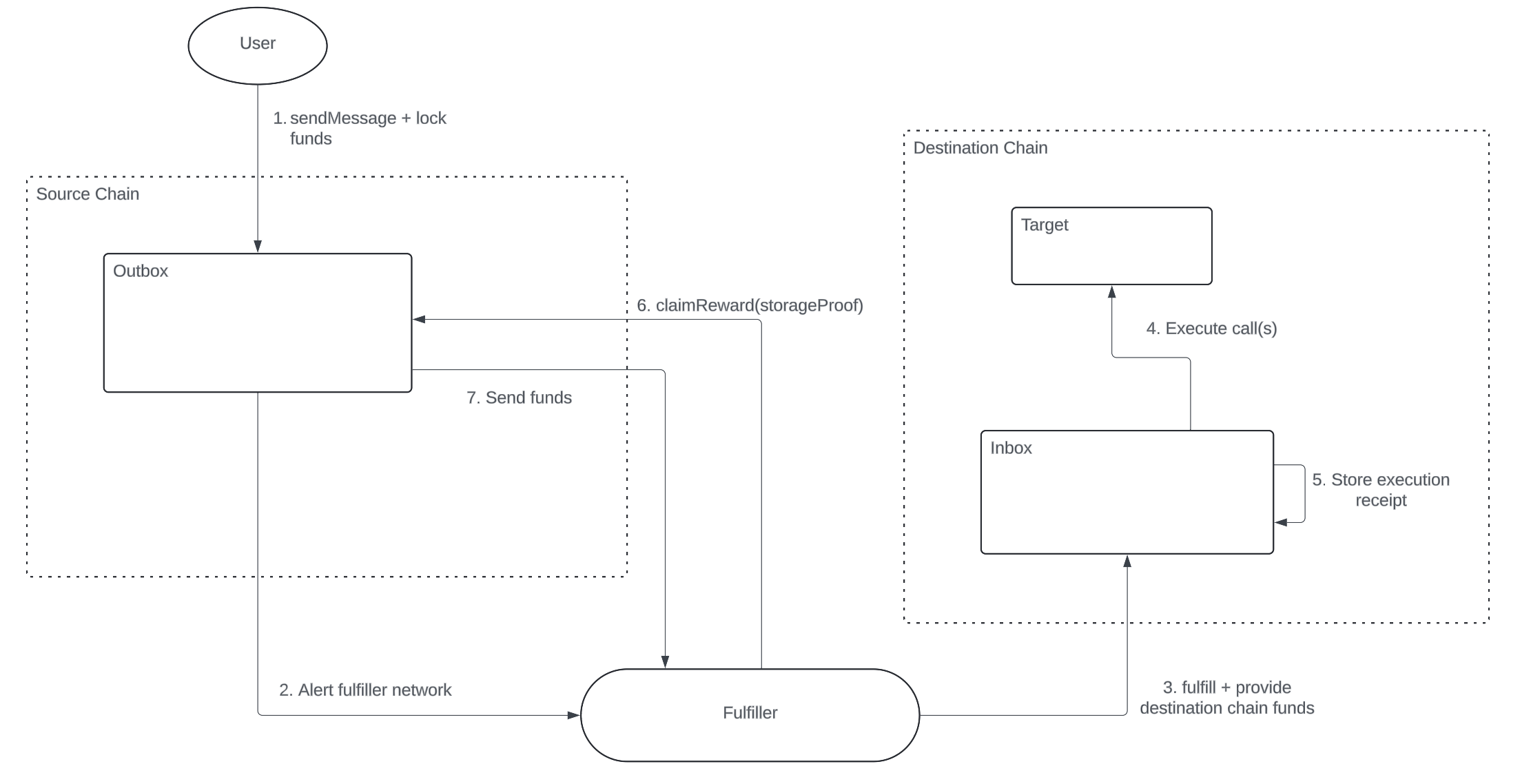
- User submits request with reward funds to
Outbox Outboxemits discovery event- Fulfiller relays request to destination chain's
Inbox, including any required execution funds Inboxexecutes the requested cross-chain callsInboxstores execution receipt in contract storage- After a specified delay, fulfiller submits proof to
Outbox - Upon successful proof validation, reward is released to fulfiller
[!NOTE]
- The following specifications use syntax from Solidity
0.8.24(or above).
Data Structures
Call
Represents a low-level call specification for a transaction on the destination chain.
Fields:
to: Address to be called converted to a bytes32 formatdata: Calldata for the callvalue: Native asset value for the call
Outbox
The Outbox contract, deployed on the origin chain, manages cross-chain call requests and reward distributions. It validates request fulfillment through storage proofs and must implement the following interface.
Events
MessagePosted
Emitted when a user initiates a cross-chain call request.
Parameters:
messageId(bytes32, indexed): Keccak256 hash of the message requestsourceChain(bytes32) The chain identifier of the source chainsender(bytes32) The account address of the senderdestinationChain(bytes32) The chain identifier of the destination chainreceiver(bytes32) The account address of the receiverpayload(bytes) The encoded message to be executed on the destination chainattributes(bytes[]) The attributes to be included in the message
CrossChainCallCompleted
Emitted when a fulfiller successfully claims their reward for executing a cross-chain call.
Parameters:
messageId(bytes32, indexed): Keccak256 hash of the message requestsubmitter(address): Address of the fulfiller that claimed
CrossChainCallCanceled
Emitted when an expired request is canceled.
Parameters:
messageId(bytes32, indexed): Keccak256 hash of the message request
Methods
sendMessage
Initiates a cross-chain call request.
Requirements:
- Must emit
MessagePosted - Must lock the reward amount in the contract
- Must specify the receiver as either an
Inboxcontract on the destination chain, or the ERC-4337EntryPointcontract - The payload is either an encoded
Callarray, or an encodedUserOp - See Cross-Chain UserOps for account abstraction considerations
claimReward
Allows fulfillers to claim rewards by providing proof of successful cross-chain execution.
Requirements:
- Must verify the proof
- Must emit
CrossChainCallCompletedevent - Must transfer reward to the specified
payToaddress
cancelRequest
Cancels an expired request and refunds the reward.
Requirements:
- Must verify request expiration
- Must emit
CrossChainCallCanceled - Must refund reward to original requester
Inbox
The inbox contract on the destination chain functions as a router for requested calls and maintains a receipt of request fulfillment.
Data Structures
FulfillmentInfo
This structure holds details about the fulfillment of a request.
Fields:
timestamp: The block timestamp when the request was fulfilled.fulfiller: The address of the entity that successfully completed the call.
Events
CallFulfilled
This event is emitted when a cross-chain call request is fulfilled.
Parameters:
messageId: The keccak256 hash of the message request.fulfilledBy: The address of the entity that successfully completed the call.
Methods
fulfill
This method routes the requested calls to specified destinations and records a receipt of the fulfillment.
Requirements:
- Must execute requested
Call's - Must emit
CallFulfilledevent - Once
FulfillmentInfois stored, the receipt is immutable - Must only store
FulfillmentInfoif all calls are successful
Note: The caller specifies a custom fulfiller address, allowing a different address to claim rewards.
Storage Proof Validation
Storage proof validation is used within the Outbox contract to ensure the execution receipt exists in the destination chain Inbox storage before releasing a reward to the fulfiller. Storage proof validation implementations are chain-specific, which is why the claimReward function in the Outbox contract accepts the proof parameter as a generic bytes type. While specific proof formats may vary between implementations, all should follow this core validation sequence:
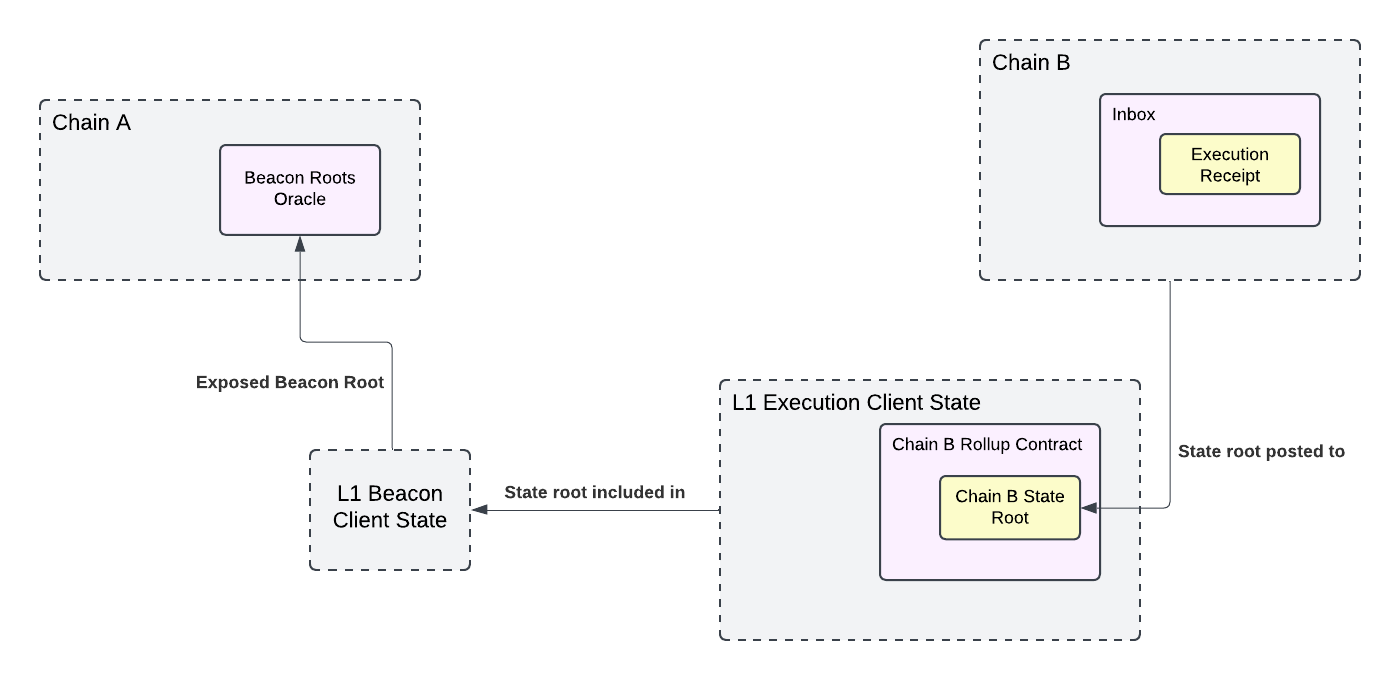
[!NOTE] Visual elements in diagram:
- Networks: Gray background
- Contracts: Purple background
- Storage values: Yellow background
Chain definitions:
- Chain A: Source chain
- Chain B: Destination chain
This example shows validation steps for an L2 -> L1 -> L2 route
Validation Steps:
- Verify that the proof's beacon root corresponds to the root exposed in Chain A's execution environment.
- Verify L1 execution client's state root against the beacon root.
- Verify Chain B's rollup contract storage root against L1 execution client's state root.
- Verify Chain B's state root against its rollup contract storage root.
- Verify Chain B's inbox contract storage root against Chain B's state root.
- Verify the
FulfillmentInfostruct at the specified storage key against Chain B's inbox contract storage root.
Important Implementation Note: Some L2 chains store an "output root" on L1 instead of directly storing their state root. In these cases, an additional validation step is required between steps 4 and 5. This step must:
- Provide the destination chain's state root
- Apply chain-specific logic to derive the output root using the state root and any auxiliary data
- Verify the derived output root matches the proven value in the destination chain's rollup contract on L1
Message Customization
The message or request structure allows flexibility to customize the behavior of the message delivery on destination chain as well as the settlement system for verification. This flexibility is achieved through the use of ERC-7786 inspired attributes. Each attribute is a bytes string beginning with a 4 byte selector followed by abi-encoded data.
[REQUIRED] Nonce Attribute
- Selector:
0xce03fdab - Contents:
- Nonce value (
uint256)
- Nonce value (
The nonce attribute prevents message ID clashing by ensuring all requests are unique. The Outbox is expected to validate the existence and correctness of the provided nonce.
[REQUIRED] Delay Attribute
- Selector:
0x84f550e0 - Contents:
- Finality delay (
uint256) - Expiry (
uint256)
- Finality delay (
The delay attribute is required for setting request expiration. It can also optionally set a finality delay that is used to prevent the fulfiller from claiming their reward too soon. That's necessary if the proof is against unfinalized state for an optimistic rollup. If the proof is against finalized state, the finality delay is unnecessary and can be ignored by the Outbox. The expiration is required in all cases and is used to ensure fulfillers have enough time to claim rewards after request delivery without the possibility of users taking their funds back.
Request Flow with Finality Delay
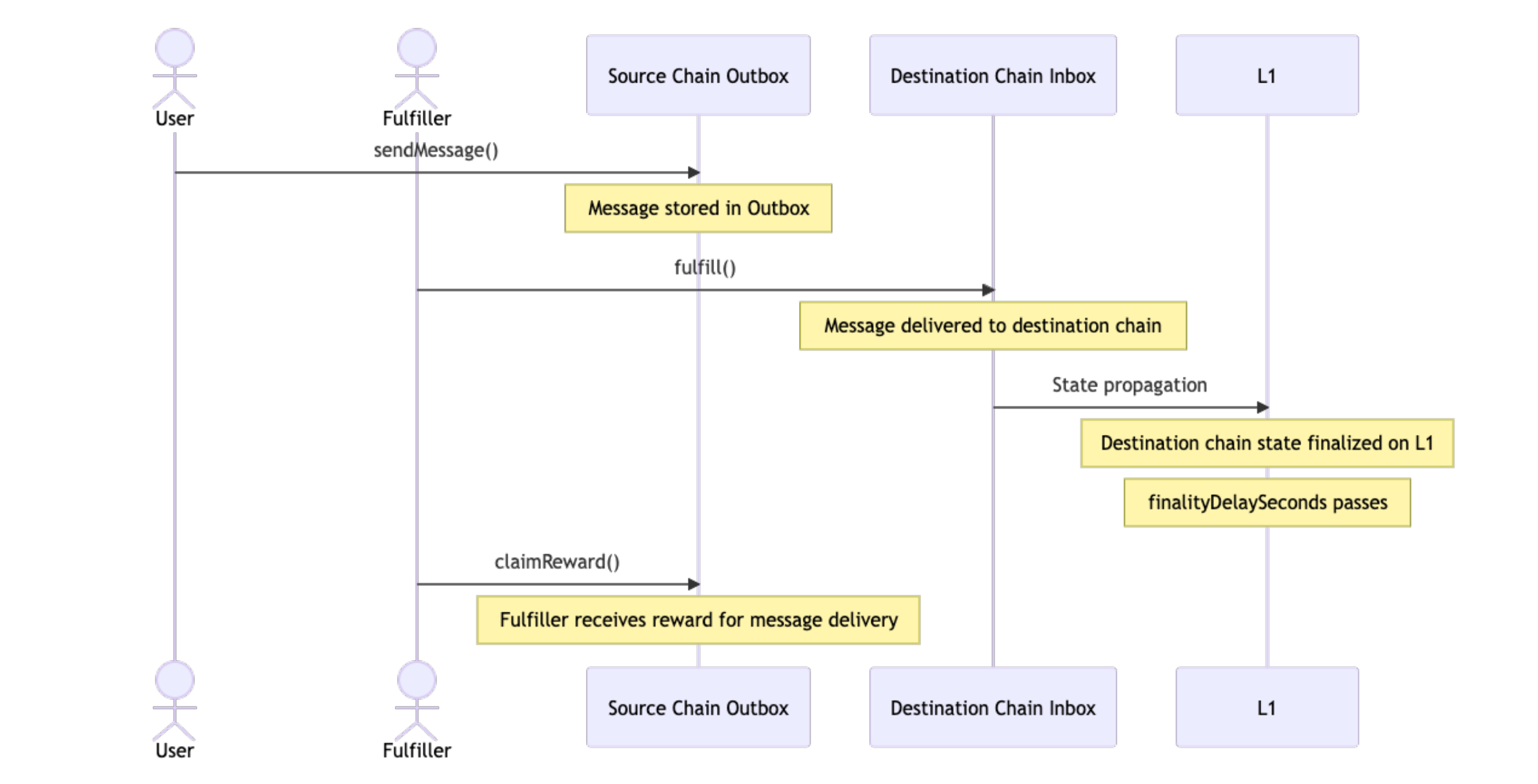
Cancelled Request Flow
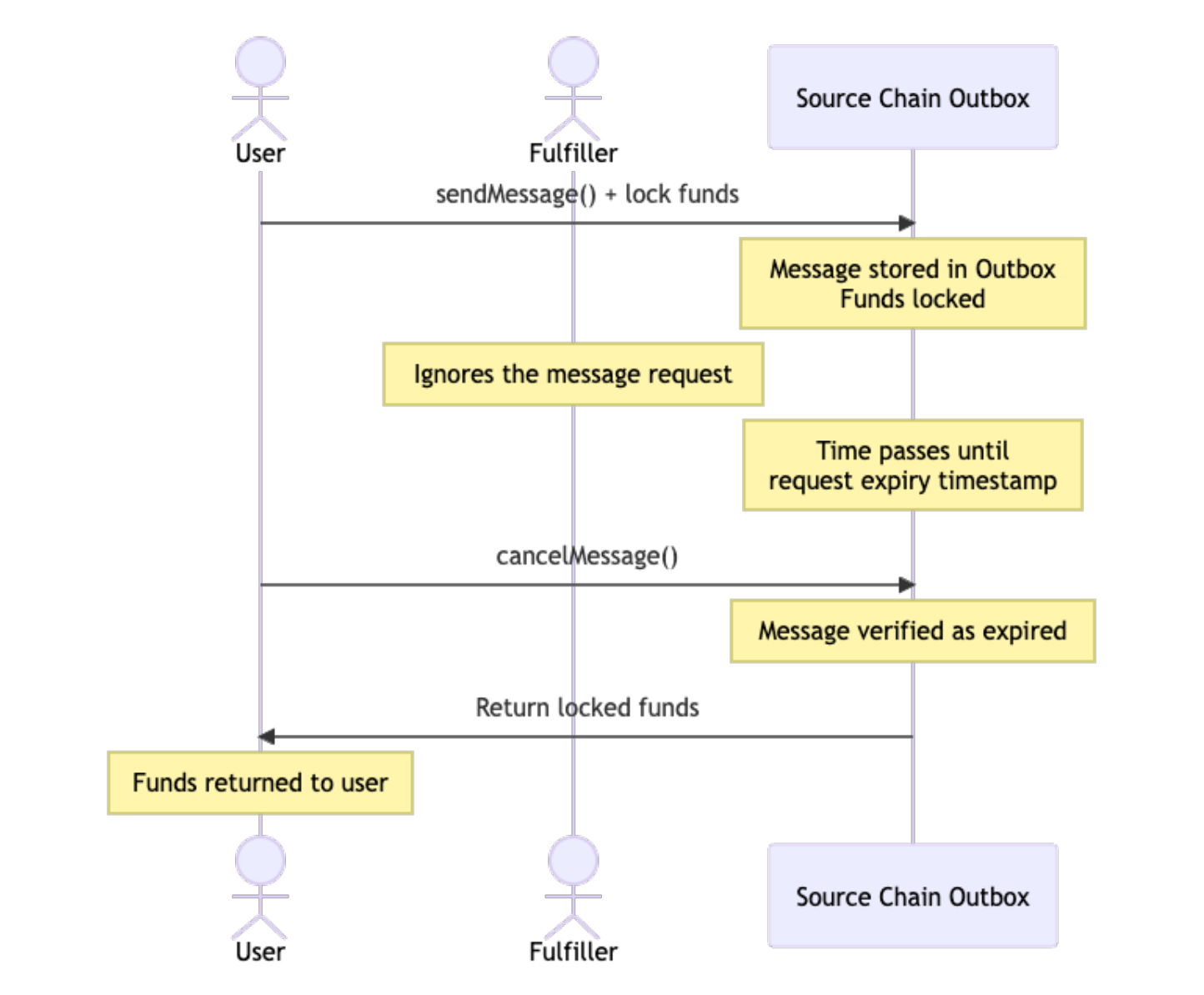
[OPTIONAL] Precheck Attribute
- Selector:
0xbef86027 - Contents:
- Destination chain Precheck contract address (
bytes32)
- Destination chain Precheck contract address (
The precheck mechanism allows the requester to guarantee some destination chain condition is true in order for their request to be delivered. This is done by deploying a precheck contract to the destination chain that validates some arbitrary condition. The precheck contract must implement the following interface and is invoked before request fulfillment.
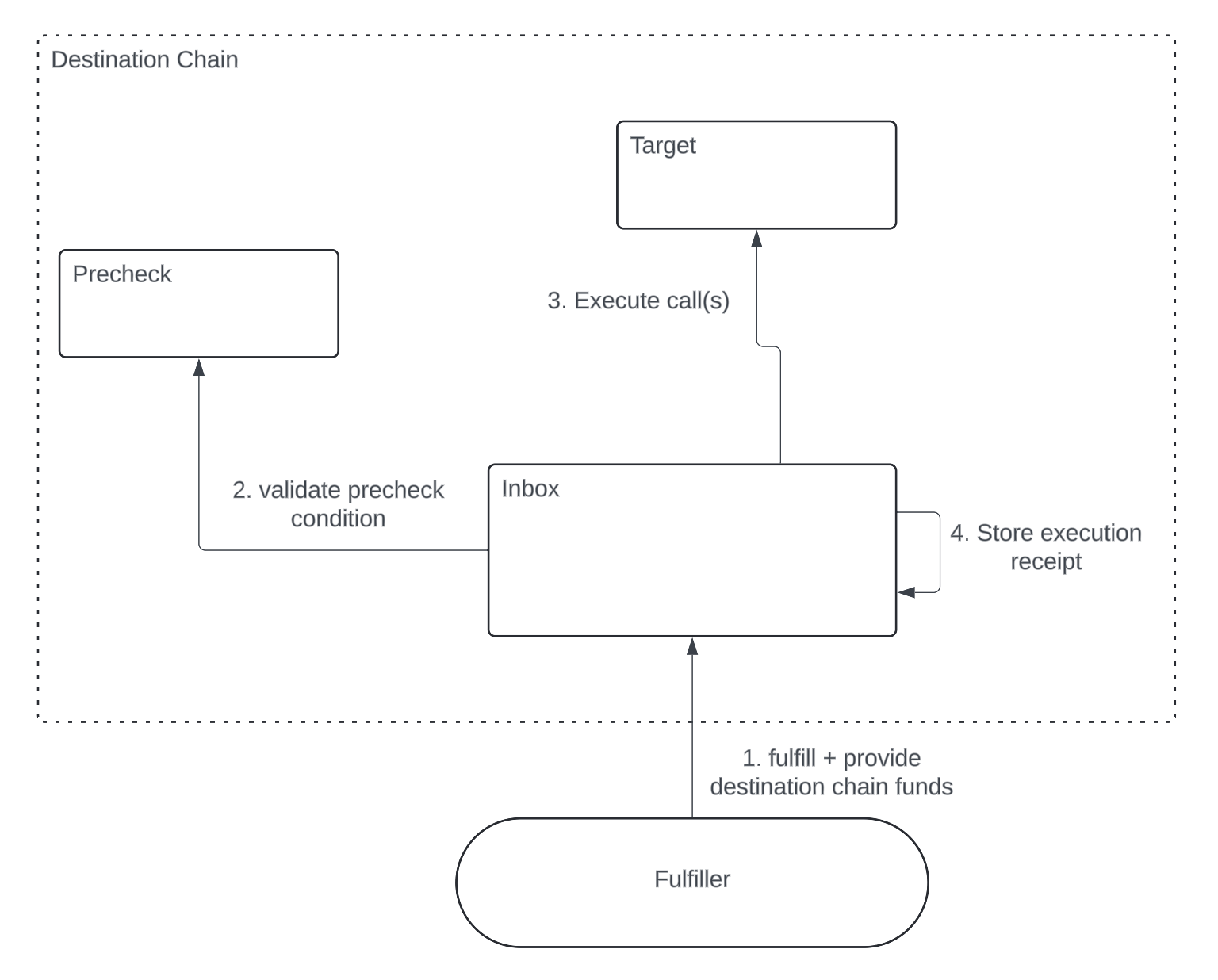
Requirements:
- Must revert if validation conditions are not met
- Includes the cross chain request and caller address as parameters. Caller is the address of the fulfiller that submitted the transaction to
Inbox.
[OPTIONAL] MagicSpend Attribute
- Selector:
0x92041278 - Contents:
- Currency contract address (
address) - Currency amount (
uint256)
- Currency contract address (
The magic spend attribute allows for requesting funds from a paymaster during call execution. This can be beneficial to fulfillers as it makes it clear which currencies are needed for call execution and removes the complexity of fulfillers needing to parse the individual calls to determine that for themselves.
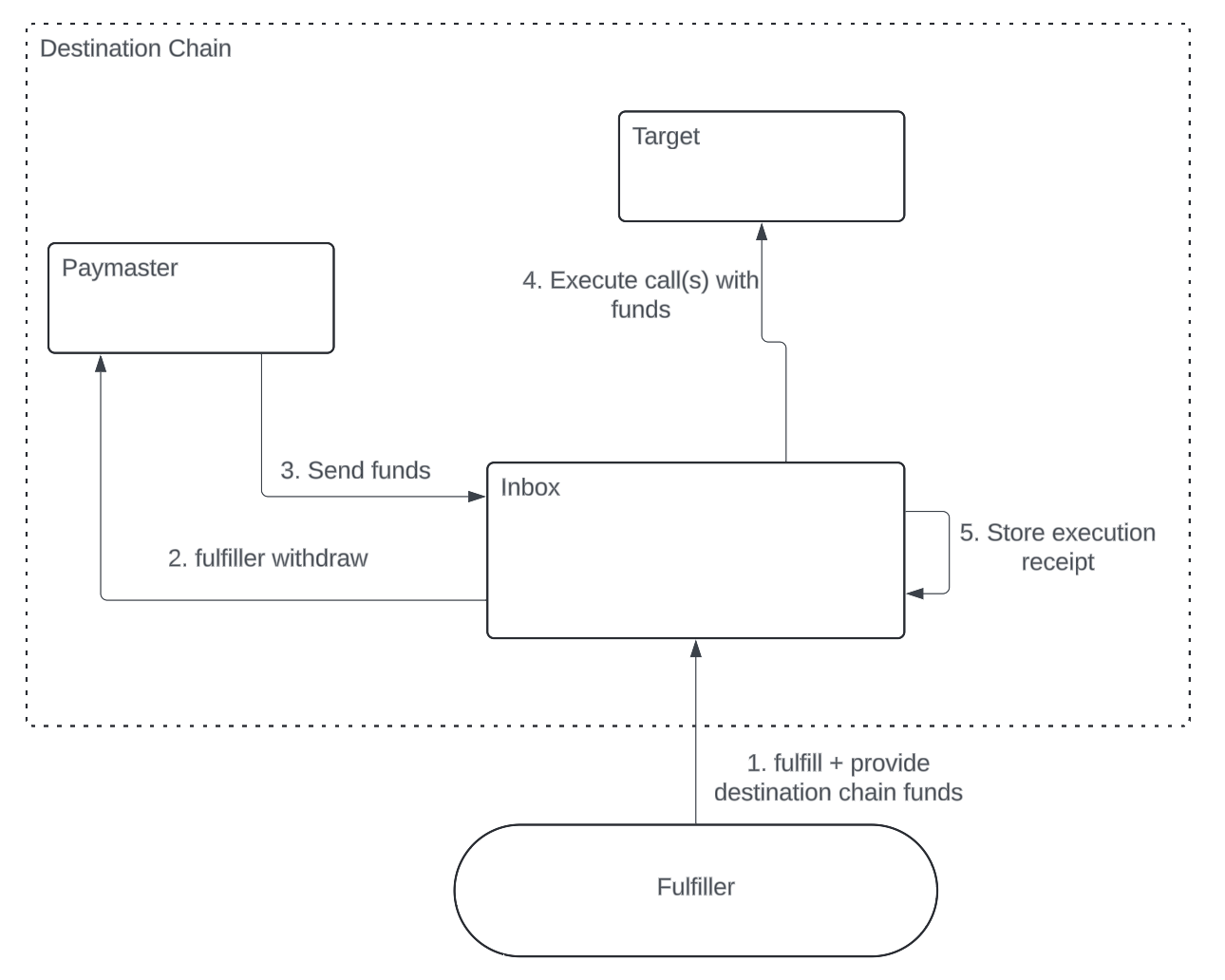
This requires access to a paymaster contract that implements the following interface. This likely can only be secure if the paymaster contract is owned by the inbox.
Requirements:
- Must revert if
fulfillerhas an insufficient balance oftokenin the paymaster - Must send
amountoftokento theInboxcontract
[OPTIONAL] Reward Attribute
- Selector:
0xa362e5db - Contents:
- Asset contract address (
bytes32) - Asset amount (
uint256)
- Asset contract address (
The reward attribute allows the requester to specify the reward to be locked in the outbox contract as fulfiller compensation.
[OPTIONAL] Inbox Attribute
- Selector:
0xbd362374 - Contents:
- Inbox contract address on destination chain (
bytes32)
- Inbox contract address on destination chain (
The inbox attribute specifies the contract of the 7755 Inbox contract on the destination chain. With standard requests (requests where the payload is an encoded Call array), this is not needed since the receiver is the Inbox contract. However, for cross-chain UserOps, this attribute should be considered required.
[OPTIONAL] Requester Attribute
- Selector:
0x3bd94e4c - Contents:
- Requester address (
bytes32)
- Requester address (
Allows the requester address to be tied to the 7755 request.
[OPTIONAL] L2 Oracle Attribute
- Selector:
0x7ff7245a - Contents:
- L2 Oracle Address (
address)
- L2 Oracle Address (
The L2 Oracle attribute allows the requester to specify the rollup contract address on L1. This is the contract that should be storing state representation for the destination chain and will be used within the settlement layer verification.
Cross-Chain User Operations
Account abstraction (AA) techniques introduced in ERC-4337 have seen widespread adoption across multiple blockchain networks. This success creates a robust ecosystem that the RRC-7755 standard can leverage to address several challenges - the most important being enabling permissioned cross-chain calls.
UserOp Integration
If a 7755 request was a 4337 UserOp submitted to the destination chain's EntryPoint contract, we solve the msg.sender problem since the call execution would route directly through the user's smart account. The caveat here is the 7755 Inbox contract then needs to become a 4337 paymaster to:
- Remove the need for the smart account to pay gas for the transaction
- Uphold the Inbox contract's core invariant of producing execution receipts when a UserOp succeeds
For this reason, message payloads can also be an encoded 4337 UserOp instead of an encoded Call array. If the message is a UserOp, the receiver field in the message should point to the destination chain's EntryPoint contract, and the Inbox attribute becomes required to specify the destination chain's Inbox contract.
UserOp Attributes and Execution Flow
When using UserOps, the attributes array in the 7755 message should be empty as the attributes would then be expected to be embedded in the UserOp itself. With that in place, the message ID derivation can borrow existing 4337 UserOp hash derivation mechanisms.
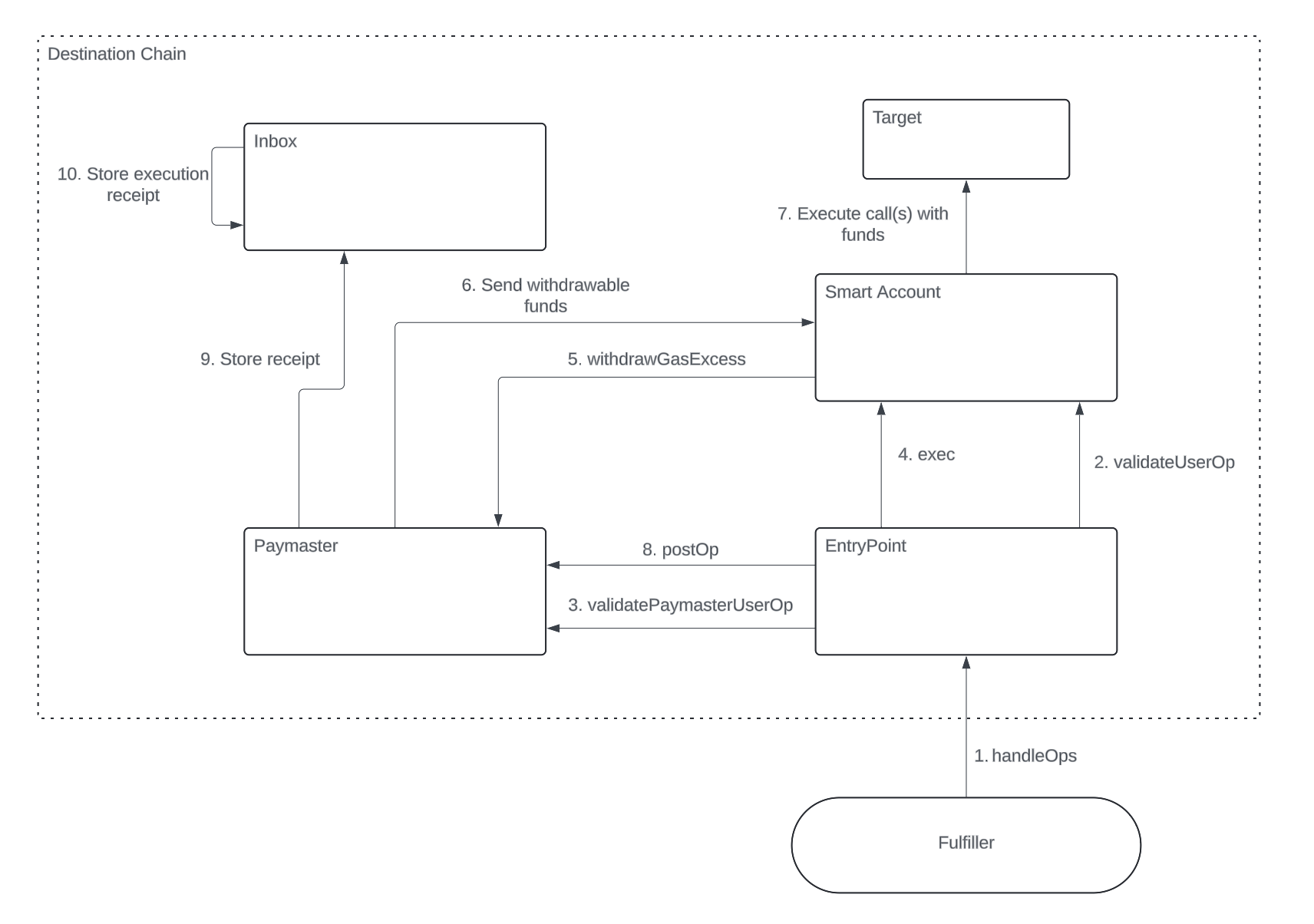
The execution flow for a UserOp-based cross-chain call is as follows:
- Fulfiller submits UserOp to destination chain
EntryPointcontract. The UserOp is expected to utilize the 7755Paymastercontract. EntryPointcallsvalidateUserOpin user's Smart Account.EntryPointcallsvalidatePaymasterUserOpin 7755Paymastercontract. ThePaymastercontract confirms the fulfiller has pre-deposited necessary funds to pay for gas + lend for call execution.EntryPointcallsexecin the user's Smart Account to execute the requested calls.- Smart Account calls
withdrawGasExcessinPaymasterif any funds are needed for call execution. - The
Paymasterwill only release approved funds from the validation step. These funds are sent to the Smart Account. - The Smart Account executes requested calls.
EntryPointcallspostOpinPaymasterwith the call execution result.- If the call(s) were successful, the
Paymastercalls into the 7755Inboxcontract to create an execution receipt for the request. - The
Inboxstores the execution receipt in storage.
Paymaster Implementation
More specifically, within the UserOp, the paymasterAndData field must be encoded as follows:
The first 20 bytes of paymasterAndData represent the Paymaster contract address, followed by a 32-byte validation data field, with the remaining bytes containing the encoded 7755 attributes.
The Paymaster contract must also implement the ERC-4337 paymaster interface to validate and pay for UserOps:
During validation, the Paymaster contract should:
- Decode and validate the attributes from
paymasterAndData - Optionally verify a precheck condition if the attributes include one
- Ensure the fulfiller has pre-deposited enough funds to sponsor the requested calls
- After execution, record the fulfillment information in the Inbox storage
This approach ensures that cross-chain UserOps maintain the same security guarantees as standard 7755 calls while leveraging the account abstraction capabilities of ERC-4337.
Message ID Derivation
StandardRequests:
UserOpRequests:
Rationale
Storage-based proof verification for cross-chain call execution provides cryptographic guarantees without introducing additional trust assumptions beyond Ethereum and its rollups. The Inbox contract's immutable storage design ensures that execution receipts, once stored, remain permanent and verifiable at any future time without increasing proof complexity.
The standard converts most address types to bytes32 to maintain forward compatibility, particularly for future non-EVM chain integrations.
The separation of rewardAsset and rewardAmount enables support for diverse reward types independent of the cross-chain transaction currency. For instance, while executing a cross-chain transfer of USDC, the reward could be denominated in ETH. The fulfiller must verify that the reward's value adequately compensates for the transaction costs before processing the call.
The finalityDelaySeconds parameter enhances security by ensuring sufficient confidence in destination chain finality before proof submission. This is only relevant if a prover relies on unfinalized state and this security measure can adapt as L1 and L2 consensus mechanisms evolve.
The l2Oracle specification enables proof validation reuse across compatible chains. For instance, multiple OP Stack chains can share a single Outbox contract while maintaining separate l2Oracle instances.
Security Considerations
Storage Proof Validation Risks
Hard forks in any chain can compromise storage proof validation compatibility. This incompatibility may arise from:
- Changes to the chain's state layout (e.g., migration from Merkle Patricia Trie storage)
- Modifications to L1 data storage mechanisms
Critical Impact: Incompatible storage proof validation can result in locked funds in Outbox contracts. Fulfillers must actively monitor for upcoming hardforks of supported chains.
Fulfiller Risk Management
The system architecture shifts primary risk exposure from users to fulfillers. Key risks include:
-
Reorg Risk: Immediate request fulfillment exposes fulfillers to potential source chain reorganizations, which may result in:
- Transaction reversals
- Token transfer losses
-
Request Validation Requirements
At a minimum, fulfillers must validate all requester-set fields against these criteria:
| Condition | Description |
|---|---|
| Confirm the destination chain | Ensure the request's designated destination chain is compatible with the source chain's Outbox. Example: A request originating from an OP Stack outbox and destined for Arbitrum is invalid. |
| Confirm the destination chain receiver | Verify that the request's destination chain receiver is a recognized Inbox or Entrypoint address. |
| Confirm the L2 Oracle | Check that the specified L2Oracle is valid for the destination chain. It should be the rollup contract address on Ethereum Mainnet that the destination chain posts state to. |
| Confirm the finality delay | If the finality delay is too short, the requester could reclaim their reward before the state is provable on L1, allowing funds to be effectively stolen. If the delay is too long, the opportunity cost of locked funds becomes high. |
| Confirm the offered compensation | The fulfiller should ensure the reward covers estimated gas costs for submitting the request on the destination chain, estimated gas costs for proving the request and claiming the reward on the source chain, any required funds for execution on the destination chain, and the opportunity cost of locked funds during the finality delay |
| Validate UserOp | If the request is a UserOp, ensure the paymaster address is a recognized 7755 paymaster |
| Confirm fulfiller funding | The fulfiller should confirm it has sufficient balances to cover all funds needed for destination chain call execution |
Copyright
Copyright and related rights waived via CC0.